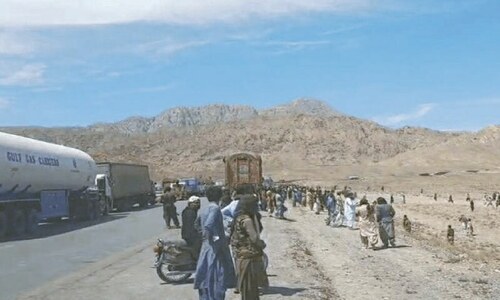
IN the introduction to Pakistan at the Crossroad, Christophe Jaffrelot labels Pakistan as a “client state” and a “pivotal state”. For long, we had been dubbed an ideological state and a security state.
None of these titles are too flattering, but they are not inaccurate. The status of being a client and a pivot stems from Jaffrelot’s observation about Pakistan’s “ability to navigate at the interface of domestic and external dynamics”.
This has been increasingly in evidence with the passage of time as the country is sucked deeper into the quagmire of external and internal conflict and instability. The two are intricately intertwined. That is what we are witnessing today in the wake of President Donald Trump’s announcement of Aug 21 of America’s Afghan policy and the disqualification of Nawaz Sharif by the Supreme Court’s judgement in July.
What is bizarre is the conduct of our foreign and security policies in a manner that blatantly ignores the needs and interests of the people of Pakistan. These policies are designed to protect the economic and political privileges of a civilian and military oligarchy.
We’ve been running with the hare and hunting with the hounds.
Of course, the beneficiaries do not admit that. They have excelled in navigating the stormy waters of regional confrontation by drawing on the support of outside powers rather than consolidating the country’s political economy so that it doesn’t have to lean on others to pull its chestnuts out of the fire.
To cope with this situation, successive governments have depended on a massive inflow of arms and economic aid from abroad which have naturally come with strings attached. In the process, we have tried to achieve the impossible feat of befriending the US, Britain, the Arabs, Iran, China and Russia — all at the same time. Meanwhile, we have also been accused of manipulating the non-state actors that our security aims have spawned. Given the contradictions in this, we have managed to tread on quite a few toes and annoy friends of long standing. All this has been done against the backdrop of strained relations with India, our proclaimed enemy number one.
The focus has been more on security than unifying the country, integrating the people and befriending India. The outcome has proved to be counterproductive. We have not become a military powerhouse. Nor have the people emerged as a well-knit nation. The ambition of becoming a nuclear power has cost us heavily making Pakistan more vulnerable and insecure than ever.
The non-state actors — considered ‘strategic assets’ — have proved most detrimental to our well-being. Since 1947 when tribesmen entered Kashmir at a time when the maharaja had entered into a standstill agreement with Pakistan, we have been accused of using non-state actors when needed. Instead of the normal tools of diplomacy being accessed, Operation Gibraltar in the Kashmir Valley in 1965, the various lashkars in Kashmir and Kargil and the so-called Mujahideen and Taliban in Afghanistan relied on force.
Today we feel the US has betrayed us. But should we not blame ourselves as well? First, we extended a helping hand to Messrs Brzezinski and Carter in 1979 when they drew up their sinister scheme of making Afghanistan ‘Russia’s Vietnam’. At American behest, ‘freedom fighters’ sent across the Durand Line to provoke the Russians and start a war in Afghanistan that has still to end. After 9/11, we have been running with the hare and hunting with the hounds much to the annoyance of the Americans as well as the jihadists. Both have reacted. American drone attacks and Islamist suicide bombings have crushed our people.
Where the present crisis is concerned, Beijing has duly responded by issuing a statement of support. At the moment, China is the only countervailing option we seem to have. But in the long term, overdependence on China is not advisable either.
The Chinese have developed their own model of bringing territory under their sphere of influence. They are known to pour huge amounts of loans into countries that cannot repay them within the specified period. The practice has been for the creditor to penalise the recipient state by taking control of the projects funded by Chinese loans.
At the root of the choices that Pakistan has made lies the country’s fear of India and its determination to establish parity with it. Even after 70 years we have not managed to negotiate a pragmatic working relationship with the Indians. Given our smaller size and fewer resources, they have gained the upper hand even in the game of surreptitious measures.
The need of the hour is to reach some understanding with India eschewing violence. Secondly, we must recognise that we can no longer continue to be a nation of beggars that depends on outside patrons to fund our economy. There will always be a price to pay. We have to learn to be self-reliant.
Published in Dawn, September 1st, 2017














































